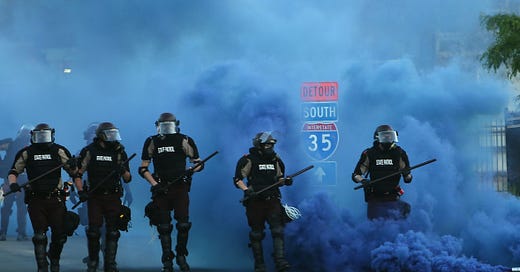To Make Police Accountable, End Qualified Immunity
In their preference for a policy that protects police, conservatives abandon their commitment to textualism and embrace pro-government judicial activism.

If you haven’t watched the video of (former) Minneapolis police officer Derek Chauvin killing George Floyd by jamming his knee into Floyd’s cervical spine for nearly nine minutes until he loses consciousness, you really should. And if you can’t understand why large swaths of urban America have been in flames these last few nights, do two more things: (1) instead of George Floyd, who you probably don’t know, imagine the person pinned under Chauvin’s knee—prone, handcuffed, unresisting, and begging for mercy—was someone you love; and (2) listen to conservative pundits dissecting Chauvin’s merciless assault on Floyd with all the sangfroid of a referee performing an instant replay review to see whether the runner’s knee was down when the ball came loose. No wonder it seems as though the country is coming apart at the seams.
In determining the relationship between government and governed, one of the most important decisions a society can make is how accountable those who wield official power must be to those against whom that power is wielded. Congress made a clear choice in that regard when it passed the Enforcement Act of 1871, which we now call “Section 1983” after its location in the U.S. Code. Simply put, Section 1983 creates a standard of strict liability by providing that state actors “shall be liable to the party injured” for “the deprivation of any rights.” Thus, if a police officer walks up to your house and peeks inside one of your windows without a warrant—a clear violation of your Fourth Amendment right against unreasonable searches—he is liable to you for the violation of that right.
But many conservatives do an odd thing: In their preference for a more forgiving policy that gives police and other government officials substantial leeway in the exercise of discretion, they abandon their stated commitment to textualism and embrace an “interpretation” of Section 1983 that is utterly divorced from its text. The vehicle for this conservative brand of what we might call “living statutory interpretivism” is the Supreme Court’s qualified immunity doctrine, which judicially amends Section 1983 to provide that the standard for liability will no longer be the deprivation of “any rights”—as Congress expressly provided—but rather the deprivation of any “clearly established” rights.
As documented in considerable detail on Cato’s Unlawful Shield website, those two words—“clearly established”—do an extraordinary amount of work in keeping meritorious cases out of court and ensuring that plaintiffs whose rights have been violated by police or other state actors will receive no recovery unless they can find a pre-existing case in the jurisdiction with nearly identical facts. But that is plainly not the statute that Congress wrote, nor is it the standard of accountability that Congress chose. Moreover, as Professor Will Baude demonstrates in his masterful article, “Is Qualified Immunity Unlawful?,” there is no credible textual or historical basis for the qualified immunity doctrine; it is a blatant act of pro-government judicial policymaking—activism, if you will—and nothing more.
So now back to the killing of George Floyd. Watching that horrific video, one cannot help but notice the look of utter complacency on the face of Derek Chauvin as he drives his knee into Floyd’s neck. There is no life-or-death struggle—indeed, no struggle at all; nor is there any evident anger or passion—there is simply the banality of a man wearing a badge, surrounded and supported by other men with badges, methodically squeezing the life out of another human being.
It is well known that prosecutors rarely bring criminal charges against police officers, and indeed it seems unlikely Chauvin would have been charged had his assault on George Floyd not been captured on a viral video. That means the only avenue of accountability for most victims of police misconduct is a civil rights lawsuit that they themselves can initiate without the largesse of some prosecutor or citizen review board. But the Supreme Court has largely gutted that remedy with a judicially confected gloss that transforms the legislatively chosen policy of strict liability into one of near-zero accountability.
Cities are burning, and many people are venting their rage—yet again—about how cavalier police have become with the use of force, including lethal force, against the very citizens they are sworn to protect. Those people are right to be angry, and they’d probably be even angrier if they understood that it was never supposed to be like this—that Congress specifically chose a system of robust government accountability that was repudiated and perverted by the Supreme Court.
This Monday we will find out whether the Court will take the unprecedented opportunity it now has to revisit qualified immunity. It will be particularly interesting to see which self-styled conservatives—on and off the Court—place their stated commitment to textualism and judicial deference above whatever personal preference they may have for continuing our half-century experiment in near-zero accountability for law enforcement.




